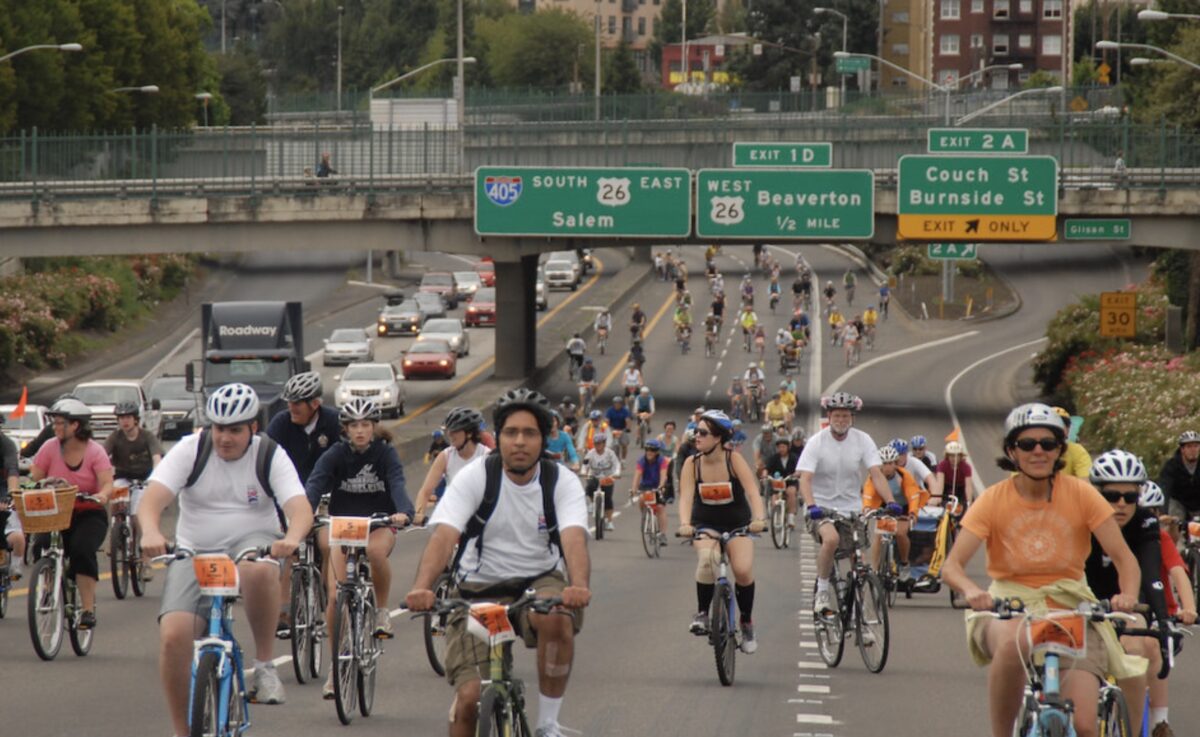
(Photo: Jonathan Maus/BikePortland)
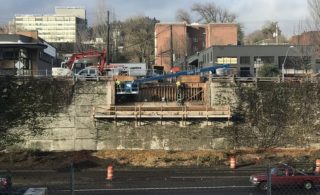
(Photo: PBOT)
Something magical will finally happen this weekend: The Portland Bureau of Transportation will install the Flanders Crossing Bridge over I-405.
It’s a day we’ve dreamt about for 15 years, ever since former PBOT Commissioner (then Mayor) Sam Adams hatched the wild idea to recycle the old Sauvie Island Bridge span at the same location. We’ve written at length about why this $9.5 million bridge will be so important for bicycling in northwest Portland — both figuratively and literally.
Advertisement
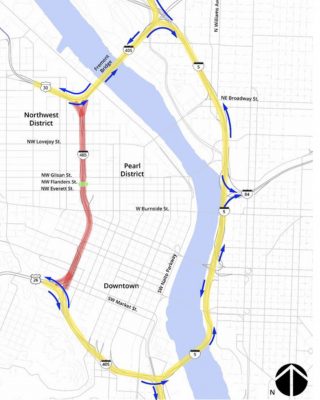
A major milestone in the construction of this bridge isn’t the only magical thing that will take place this weekend. ODOT also plans to do a full closure of I-405 between Highway 26 and the Fremont Bridge to facilitate the work crews. The closure will last from Friday night (10:00 pm) to Monday morning (5:00 am). If you want to watch the historic action — cranes on each side of the freeway will move the 355,000 bridge into place — PBOT says the work will begin around 9:30 am on Saturday (1/23) and will last about eight hours.
The closure will also give us a chance to feel what it’s like to remove a a freeway that goes through the heart of our city. Every year momentum builds for urban highway removals and there’s even a $10 billion bill floating around the U.S. Senate for that expressed purpose. Portland should be in that conversation. Both I-5 and I-405 are perfect candidates for removal and redevelopment. The amount of space and life our city would receive in exchange would be truly transformational on many levels.
For now we’ll focus on the new bridge, but let’s not forget that we won’t transform mobility in Portland simply by adding more bicycling and walking spaces: We must also drastically reduce driving space.
Fingers crossed that this installation goes forward. PBOT says windy weather could postpone it. If all goes according to plan we’ll be using the new bridge by spring 2021. Check the project website for full details.
Oh, and where should we meet up for the viewing party on Saturday? I hope to see some of you out there!
— Jonathan Maus: (503) 706-8804, @jonathan_maus on Twitter and jonathan@bikeportland.org
— Get our headlines delivered to your inbox.
— Support this independent community media outlet with a one-time contribution or monthly subscription.



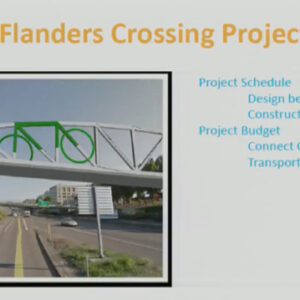
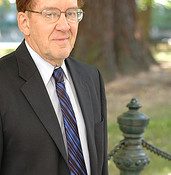


Thanks for reading.
BikePortland has served this community with independent community journalism since 2005. We rely on subscriptions from readers like you to survive. Your financial support is vital in keeping this valuable resource alive and well.
Please subscribe today to strengthen and expand our work.
Great opportunity to bike to the PSU farmers market, support local famers/vendors and then go to the new bridge. Meet at market ~10:30 am, ride to the new bridge at noon. Sound okay?
Hi PSU TREC data researchers…this closure would be another great chance to collect multi day baseline data as to the noise and air pollution impact of I-405 traffic.
we’ve had reams of data to collect in this regards locally and globally from pandemic shutdowns….and it’s not really that impressive…what more are we looking for?
Would you share a link to the data, so I can see what exists? The key here would be the ability to isolate the impact of i405 on the adjoining communities (as a multiday shut down is better than just a few hours of the Bridge Pedal for one point in time) vs. COVID19 has affected the entire region.
Todd Not being obtrusive, but providing that data is not my job description…but we are all aware of significantly reduced traffic, esp in march/april here in pdx…there were many days where i saw no one on the roads myself.. The impact of global shutdown on emissions seems readily accessible in one form or another….i wud suspect somewhere in pdx there wud be #s available, no?
Wait…You guys say we should close collectors and arterials to cars to force them onto the freeway…but you also want to close the freeways? What about all the people that need to drive? (most don’t have the LUXURY of not driving) Just screw them?
Also, how fast until it’s covered in tents and tarps and nobody wants to use it anyway? Lol
You guys are an interesting bunch…
Often when congestion pricing starts in a city, rush hour disappears. The reason for this is that many people who make trips during this time do not actually “need to drive.” It’s simply the fastest and cheapeast manner of transportation because in the US we make it essentially free. If we removed sidewalks, almost no one would walk. That is the analog of what has happened here. We have made all other forms of transportation essentially worthless or unsafe.
If we removed freeways, as many other cities have done, people would likely choose to live in a much different manner. If we built a network of safe trails and protected bike lanes, the majority of people would choose to walk and bike (it’s so much more fun than sitting in traffic). We have built 100 years of roads designed for cars almost exclusively, ignored the 40k+ people killed on roads in the US annually, and trained ourselves that that is the best, ahem ONLY, way to travel. In less than 50 years, as evidenced by BP and the EIA we will essentially have no oil. Many cities in the world have made significant gains in allowing people to choose different means of transport by making safe infrastructure. That is why people want to remove freeways in the city center and build protected bike lanes on arterials.
I’ve seen plenty of people walking along SE Powell without sidewalks. Removing urban highways won’t transform Portland (though it might improve adjacent neighborhoods and make surface congestion worse everywhere). Removing suburban highways and moving everyone into the urban core would be far too expensive to ever consider (imagine having to reconstruct our cities while we’re living in them!)
Really great example Squareman. The Embarcadero Freeway was a Hellscape, not unlike I5 on the East Bank, and similarly redundant. Urban freeways are almost always looked at as an essential piece of infrastructure until they’re gone.
Seattle also took down the Alaska Way Viaduct which ran through the city. Of course they replaced it with a 2 BILLION dollar tunnel.
https://www.wsdot.wa.gov/Projects/Viaduct/Contents/Item/Display/1701
There were looking at adding a single lane to rose quarter for about $700 million. Would happily triple that to get a tunnel.
2 billion would likely be incredibly cheap for a tunnel stretching from the RQ to the So. Waterfront. With congestion pricing and a few tweaks to our current transportation system, we could have the same capacity for essentially free.
It’s not all about capacity….
What else would a multibillion dollar tunnel offer? The Big Dig in Boston was over $20 billion. Would it not be more cost effective to build a subway tunnel so Portland can have functional rapid transit downtown?
Actually found out the total project was closer to 3.35 BILLION (including cost overruns, removal of old viaduct and associated projects). A billion here, a billion there. Portlanders love taxes so much maybe we should have an initiative to fund a tunnel. We would only allow hybrids and electric cars of course to reduce the carbon footprint. Haha!
https://www.wsdot.wa.gov/Projects/Viaduct/Budget
I think you have it backwards. The way the tight oil business is collapsing, Oil depletion is moving forward rapidly even during the pandemic and cars are skyrocketing in price or not being produced because of a shortage of computer chips ,(Driving will soon be the LUXURY) that most of us can’t afford.
“oil depletion is moving forward rapidly…”
huh? can u expand…i typically think u are bringing more than “peak oil” arguments to the table so i’m wondering what i’m missing….thx
What most people don’t understand is that oil does not behave like a normal commodity. It is the master resource that powers an industrial economy. Things like solar, wind, nuclear and electric cars are just its step-children. Oil depletion does not show up as gas lines or high prices it manifests itself as predicament where oil bounces back and forth between a price that is too high for the economy and a price that is too low for oil producers. We are pretty much there now,at a place where the oil prices we have had for the last 10 years have driven tight oil producers ( and much off shore, tar sands etc) to bankruptcy yet if they go any higher the economy goes in to a funk ( 2009). Alaskan and North Sea oil are effectively gone, the full political cost of oil in Saudi is so high that they have ceded control as the swing producer to the Russians. The pandemic has given us a break at the consumer end but at the price of the destruction of much of the oil industry.Sorry to burst your bubble, but Elon will not save happy motoring. Ordinary Americans 10 years from now will more likely be riding pedal bikes than electric cars.
thank you…an political/economic structure designed to be sustainable/profitable (and stable) at oil >$73 barrel is certainly being squeezed when oil has a problem getting out of the $35-60 range….agreed. of course the market can always consolidate and rebound, dollar can continue to fall out of bed, and your 2009 mention is a throwaway line, but agreed. but think the migration of mass of society to pedal power over cars may need the push of something extraordinarily spectacular…like the abolition of private property for example.
You have heard of electric cars right?
They don’t need oil.
And then, there’s the lithium that’s in the batteries…shall we ask the miners who pull that out of the ground how clean electric transportation is?
Plenty of articles and comments on this site about how electric bikes are the future. I guess batteries are only an issue for cars though, right?
And as more people turn to electrics demand will go down leaving plenty for shipping. Not sure what you’re getting at about the surface we drive on. Concrete isn’t derived from oil. Sure, asphalt is but we only use it because it’s cheaper. We would just go back to concrete.
What tires will you use on your bike when we “run out of oil”?
My neighbors, all respectable granola & sandals doctor an accountant couple, have a Tesla and a Leaf + a pick-up with a transfer tank in the back. 2 Solar panels on the roof and 2 noisy army surplus diesel generators, using untaxed red diesel or #1 diesel (basically bunker oil for ships and trains) to charge said electric cars. 4h of noise and pollution every day. The dude is loaded but a self-professed cheapskate. They’re doing this to save a buck, not the planet. Yay!
People have been singing that song for a decades and nothing has come close to what they’ve predicted.
We will have oil forever!
If we burn all our oil, climate change will kill us long before the lack of oil does. We will never run out.
You mean this one from the legendary soul band ” Tower of Power”
“There is only so much oil in the ground
Sooner or later there won’t be much around
Tell that to your kids while you’re drivin’ round downtown
That there’s only so much oil in the ground”
Close 405 and I5 becomes even more miserable. Let’s cap it instead. Remember, it’s only for the weekend. Not really representative of its usage.
If we were to close either I-5 or I-405, this is the exact reasoning I would use to say keep the I-405. The I-405 is already below grade, fits mostly within one city block, and should 100% be capped through as much of its length as is feasible. Capping even just the 5 blocks between SW Taylor and W Burnside would be transformative for downtown; healing the tear between the financial downtown core and the housing in Goose Hollow. Has the city or ODOT ever seriously estimated what it would cost to cap I-405? Seems like a great project to redirect the I-5 expansion money to.
Good luck getting commerce to all of these “shops”. Delusional and pretty messed up too. You really want more people? People are the problem and the number one cause of climate change. How does Amazon deliver all that crap you folks click a button to receive. Sure appreciate freeways when I escape the garbage, tarps and the endless sea of people who have no plan for the remainder of their lives.
Closing I-405 permanently is an interesting idea but I worry it would just send even more car traffic onto downtown surface streets which would make cycling even worse. Because I-405 is already mostly below grade, I don’t think it has as much of a detrimental effect on the city as I-5 does. I’d rather consider taking down I-5 and rerouting it on I-405.
But the new Flanders bridge is very exciting! I thought the day would never come.
Just like how induced demand means if you add capacity more traffic will fill it up, the experience of cities that have removed freeways is usually a dramatic reduction in traffic. Most of the peak trips just disappear, replaced by other modes, more spreading throughout the day instead of during the peak, and people changing their habits. Over time, people change location of work or home so they don’t have to drive so far or at all.
Exactly. Close I-405, and the resulting increases in traffic on alternate roadways would reduce trips. A lot of the 405 traffic is people from the HWY 30 corridor and Washington driving out to Washington County. Suddenly, living in Vancouver and working at Intel isn’t going to look like such a great idea…
The current RQ project may be a good indicator for cost. There is an enormous cost difference between buildable caps and caps that might include a park. Then the question is: Is it worth it? In some cases perhaps. Seattle ($18 mill per acre) has freeway park, NY has the Cross-Bronx xpwy cap. IMO the benefits seem very related to the length of the cap. I don’t see any benefit, for example, to the proposed caps in the I5 RQ project, which will simply be unconnected dead space. I find both Freeway and Cross-bronx xpwy park to be grossly inadequate. Boston’s cut and cover Big Dig was >$20 billion. It’s nice, but with that money they could have routed traffic around downtown and made the MBTA actually decent. I like the idea of capping 405 in theory, but I’d also much rather see I5 removed and a functional transit system through downtown.
Assuming for the sake of argument that we want to remove these urban freeways from the downtown core but there isn’t political support for removing them entirely…how about a single tunnel replacing both I-5 and I-405, with one tunnel entrance just north of Rose Quarter (so we can truly implement the Albina Vision concept of reconnecting the grid) and the other south of the South Waterfront area? Similar to the one in Seattle, no entrances or exits, it’s purely for freight and other long-distance travel. People who want to go downtown use surface streets and boulevards.
Let’s shut down I-5 next and reconnect the Central Eastside to the Willamette River.
https://www.cnu.org/highways-boulevards/freeways-without-futures/2019#5
It’s been a while since I’ve seen that image, Jim! Thanks for sharing!
All of that traffic will filter on other roads. That’s no big deal when hardly anyone is out there (which is why that time was selected) but if you want gridlock and exhaust fumes everywhere while making it miserable to do any kind of active transport, keep trying to route all that traffic through the streets.
What basis do people here have for believing everyone will start cycling — hardly anyone is on even the separated bike infrastructure we have now? For example, one of my running routes takes me along Rosa and Willamette and I jog for transportation for distances of about 2 miles or less — I run in the separated bike lane because the surface and sight lines are better. It’s unusual for me to encounter even a single cyclist but I always encounter cars. I will never favor driving as a way of getting around, but anyone who doesn’t think pavement utilization for cars is far more efficient than cyclists is kidding themselves. Even here, it’s pretty clear that a huge percentage of people who consider themselves cyclists regard cold, heat, wet, darkness, distance (or pretty much anything other than a trivial ride) to be a hardship. So how will the elderly, physically challenged, and/or people who have to deal with much more or who have actual responsibilities that require driving — this is WAY more common that people here seem to realize.
Through traffic doesn’t need to be routed through the center of the city, but it takes much more pavement to route it around the city — not to mention all the houses, business, etc. along the path need to be demolished. There is also the issue that a major metropolitan area does in fact need a significant flow coming in and out to take care of real needs.
Sure, if we make everything totally different than it is now, people would make different choices. It’s like if we wanted to move freight more efficiently — simply widening the gauge of the rails would accomplish that. Then all that remains to do is tear out and replace all the existing rail infrastructure, switch out all the cars and engines, and also figure out how to deal with the trucking and shipping handoffs, it would be done. Easy peasy and probably more realistic than the cycling solutions often pushed here.
I disagree, Kyle – I think cycling can be a major component in solving the climate catastrophe, air pollution, etc. But we’ll need to think *differently* about what our world might look like and how it will work. What’s that old saying? “You can’t solve any problem by using the same level of thinking that got you into the problem in the first place” (which it seems as though you are doing).
During the pandemic, I’ve been cycling to places around Portland that provide a cycling challenge and that I hadn’t visited previously – places like Bull Mountain, Cooper Mountain, Mt. Scott, the west slope of Beaverton (near Bethany), etc. I’ve been AMAZED at how much housing there is in these areas. The people who live in the houses in these far-flung locations own cars and use them to get to work, school, shopping, etc.
The level of thinking that got us into this arrangement goes something like this: I would like to live in a nice house in a nice location, so I will buy a house in a far-flung location b/c it is nice AND I can simply use my car to drive as far as I need to. And official U.S. gov’t policy, at all levels since around 1920, has facilitated these actions by transforming the landscape to allow unlimited car-driving. Look at the spineless politicians from the Canby-Oregon City area who are blocking tolling on I-205, including the aptly-named Dem. Rep. Mark Meek. They all want to preserve the planet-killing status quo.
All of the car-driving is destroying our environment and our planet, so we need entirely new ways of thinking about how to get around. I don’t see dismantling of the suburbs as a viable solution, but what about developing hub-and-spoke arrangements – adding commercial cores to suburbs – that will allow people to bike to stores, work, etc?
Also the pandemic has proved that most white-collar workers can work from home. The message to employers during the pandemic has been: “If people can work from home, you MUST allow them to work from home.” That must be the rule AFTER the pandemic also – the planet requires it.
Widening the railroad gauge throughout the country is an insanely terrible idea. A fraction of that money spent on adding additional tracks so that every mainline is double-tracked would be significantly more effective in improving railroad freight efficiency.
That’s exactly Kyle’s point. With infinite money, and no restrictions on how to spend it, there’s no limit to what we can do.
I think it’s a bad analogy, in that case. So bad, in fact, that I missed it completely.
It’s not an analogy, it’s an illustration that many solutions that sound simple aren’t.
Most of the ideas to get everyone riding would require the the existing population, their needs/motivations, and how they live/work to be totally different than they are. At its core, it’s social engineering of the sort you’ll see from religious and political yahoos with little if any connection to things the vast majority of people value.
Not only is it unrealistic, it’s outright counterproductive. It causes drivers (i.e. the people you want cycling) not to take any good ideas seriously.
Good luck with that fantasy. The tracks are privately owned by entities that predate most state governments, who are the most talented at lobbying and manipulating the national government no matter who is in power.
As HK points out, that was exactly my point. You missed my reference to the fact that shipping and trucking would have to transform as they can’t just start using larger containers.
And even with no chance of that happening, it’s still more realistic than a lot of ideas I see here for getting everyone cycling.
I often find that fantasy ideas distract from conversations that might otherwise result in good proposals.
I-405 Southbound was shut down by cyclists in March 2003, in protest of the second Iraq war, which was started based on politically convenient lies. A lot of cyclists who participated and were detained got royally mistreated by PPB and the Feds. This is a part of Portland’s forgotten recent history (just sayin’).
I hope the bridge gets used, it would be a shame for it to go the same way as many other questionable recent ‘cycling enhancement improvements’.
Looks like there are still a bunch of misguided Eisenhauer fans even within the bike portland ranks. Car traffic is a gas that needs a small conduit in which to pass. Removing the 405 would simply move that gas to the other roads. 405 was a convenience imagined as a need when the car was king and minorities were neighborhoods to tear down. There would be no carmageddon other than some localized issues that could be mitigated with engineering. But since pearl clutching is more convincing than actual facts/math/reality, Portland will be stuck with 405…instead of what could be something incredible…